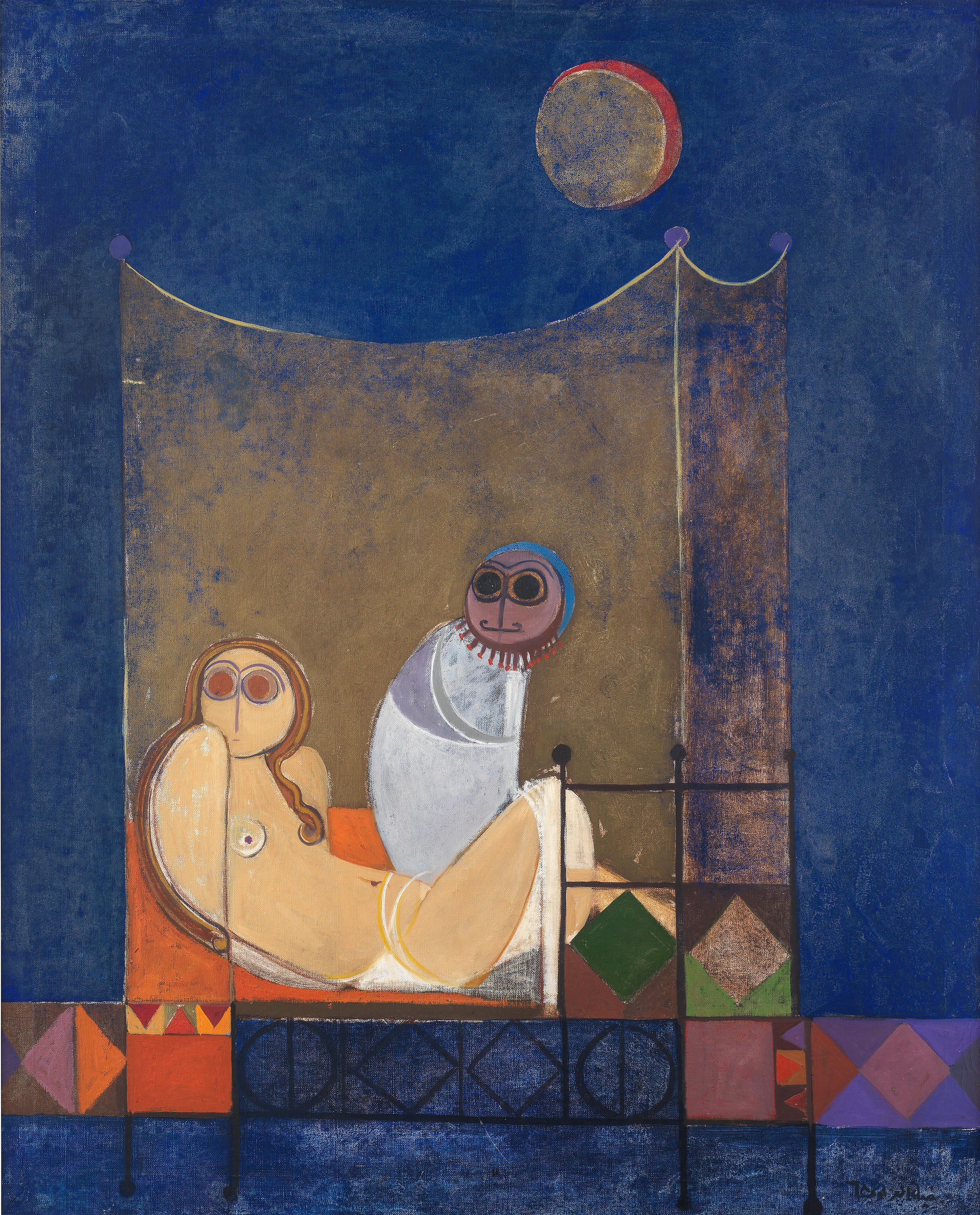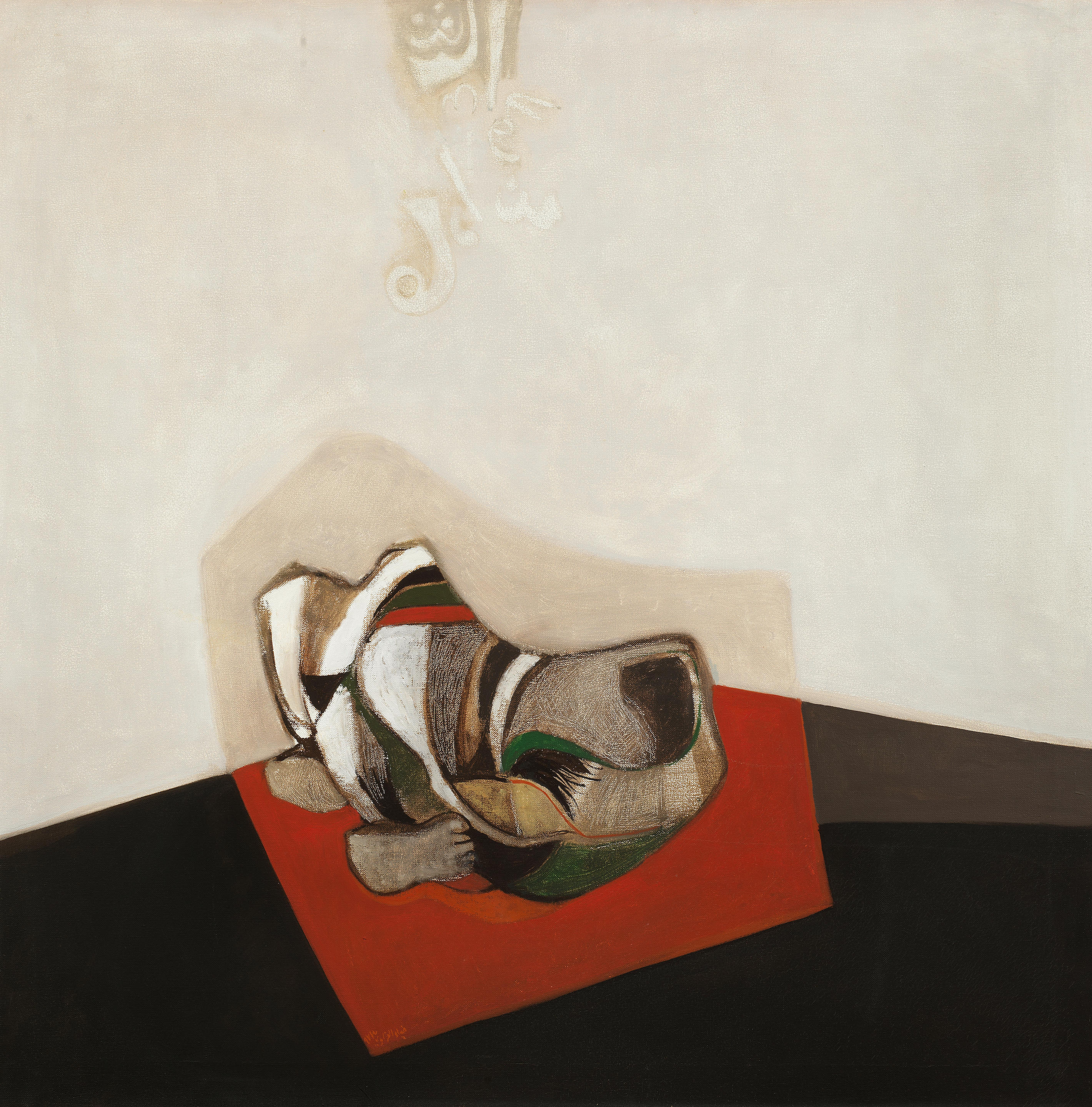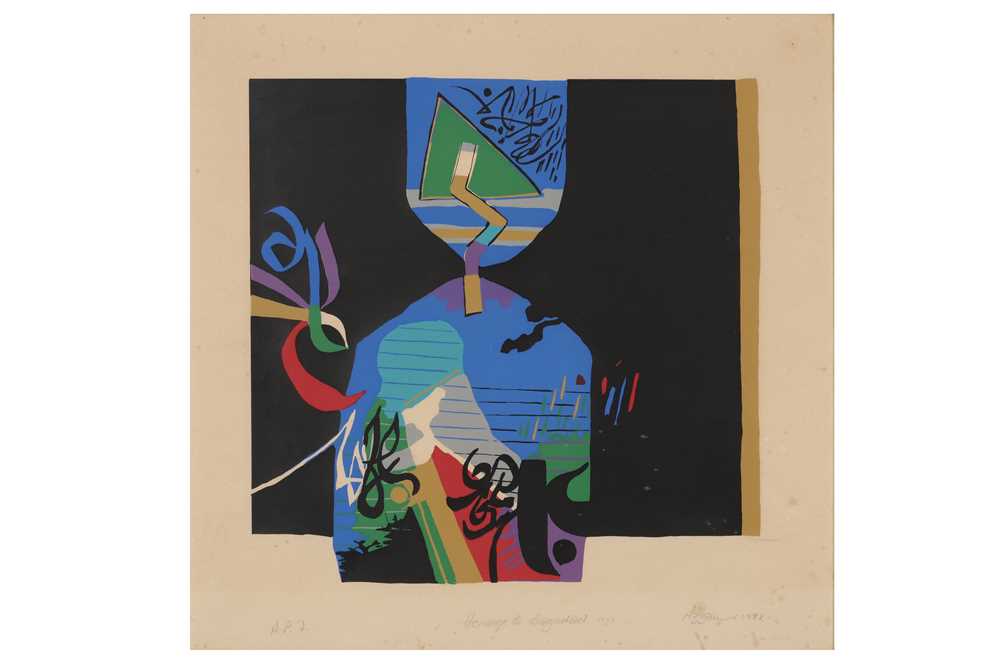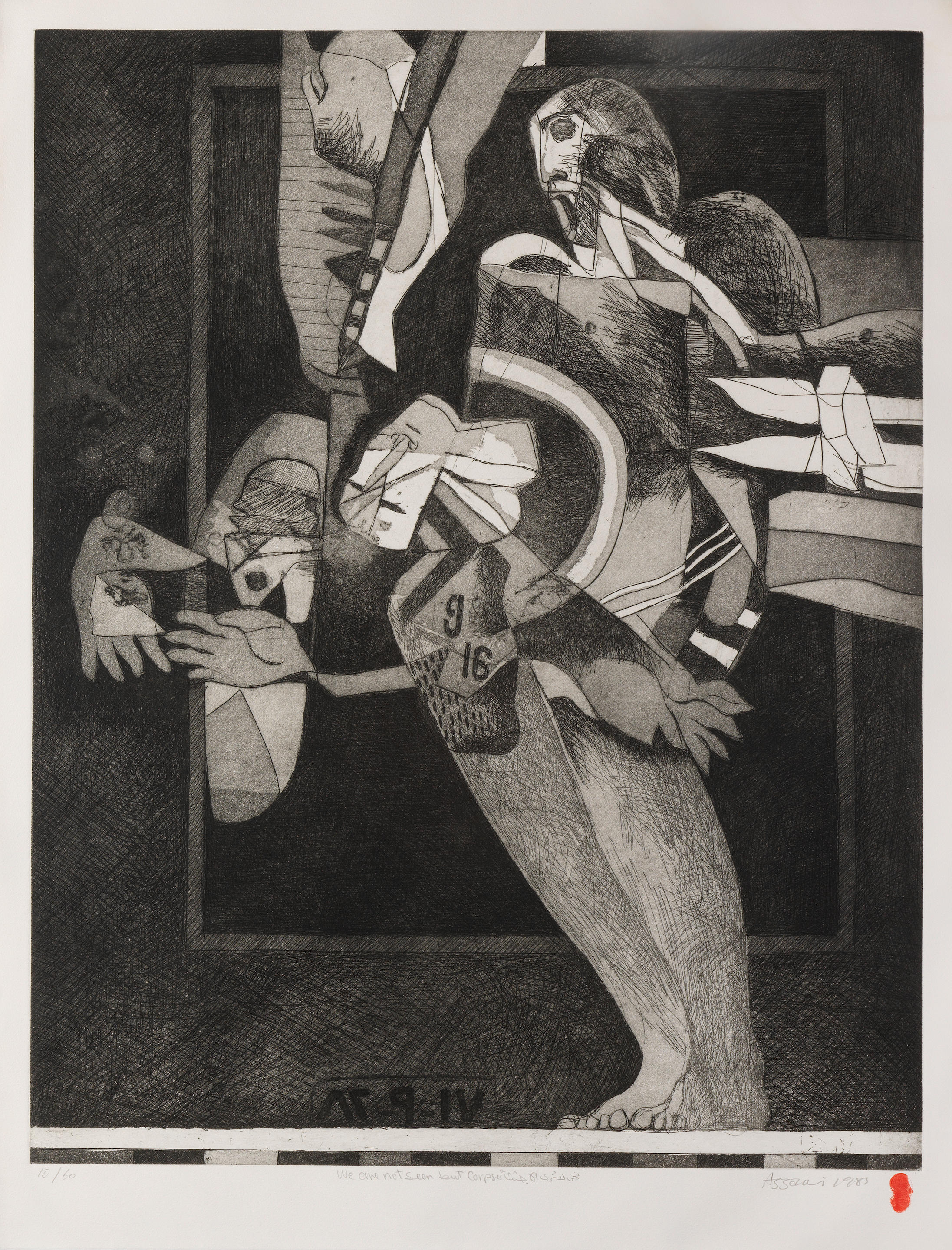Dia Azzawi (Iraq, born 1939)The Seven Golden Odes (The Mu'allaqat) silkscreen print in eight parts in original folio and case each print signed "Dia Azzawi", titled and dated "1978" in Arabic, each print numbered 43/60, executed in 1978 Each print: 103 x 72 cm (8)FootnotesProvenance: Property from the collection of Alecto Editions 1. Introduction 2. Mu'allaqat Imru Al Qayess 3. Mu'allaqat Lubid Ibn Rabia 4. Mu'allaqat Tarafa Ibn Al Abd 5. Zuhair Bin Abi Sulma 6. Mu'allaqat Antarra Ibn Shaddad 7. Mu'allaqat Amr Ibn Kalthoum 8. Mu'allaqat Al Hareth ben Halza "Oh you long night! Will you not yield to the dawn? Though daylight, like the night.. bears its share of worries What an interminable night you are! As if the stars were bound to the mountains by the tightest of chords... or as though the Pleiades were hung, unmoving in their place by ropes tied to solid rock" - Muallaqat I A HIGHLY SOUGHT AFTER AND INTACT FULL SET OF DIA AZZAWI'S MU'ALLAQAT Spectacularly detailed, rich and intricately worked, Bonhams presents a rare, intact and unopened full set of Dia Azzawi's famed Muallaqat prints; a homage to a group of seven long Arabic poems that are considered some of the defining literary works of the pre-Islamic era. The name means The Suspended Odes or The Hanging Poems, the traditional explanation being that these poems were hung on or in the Ka'ba at Mecca. The name Mu'allaqāt has also been explained figuratively, as if the poems "hang" in the reader's mind. The Hanging Odes In the eighth century, Hammad al-Rawiya—Iraq's last reciter of tribal poetry—compiled these timeless Hanging Odes. Hammad al-Rawiya, last of the true rawis or reciters of tribal poetry, was renowned among the newly urbanized Arabs of Damascus and Baghdad for declaiming poems he had heard recited by the Bedouin of the Arabian heartland. In the latter half of the eighth century he put together a collection of seven remarkable poems known collectively as the Mu'allaqat, or Hanging Odes. The Hanging Odes have always been shrouded in mystery. Legend tells that in the sixth century, some years before the rise of Islam, the poems were transcribed in letters of gold on the finest Egyptian linen and suspended from the Ka'ba in Mecca as trophies during the Sacred Months of Peace, when the Bedouin laid down their arms and went on their annual pilgrimage to the fairgrounds of 'Ukaz, near Mecca. Rival clans mingled in the marketplace, and, when not feasting or buying and selling wares, gathered round as the rawis swayed and pitched their lines to the rapt audience. The image of pagan poetry hung from the holy shrine of the Ka'ba serves to bind the ancient world of desert lore to Islam, and the poets themselves — Imru al-Qays ("the Vagabond Prince"), Tarafa ("the One the Gods Loved"), Zuhair ("the Moralist"), Labid ("the Man with the Crooked Staff"), Antara ("the Black Knight"), Amr Ibn Kulthum ("the Regicide"), and Harith ("the Leper") — have passed into legend, each lapped in a vast oral tradition. The Mu'allaqat are the most famous — and among the earliest — examples of the qasida (commonly translated as "ode"), a form that frequently runs to some hundred and twenty lines. The term may derive from the root qasada, meaning "to aim" or "go forward," or else from qasar, "to break," in reference to the mandatory division of the line into two rhythmically equal halves — a binary thrust and parry not unlike the alliterative line in Anglo-Saxon verse. The seven Mu'allaqat, and also the poems appended to them cover a vast array of topics. Tarafa's long, for example, anatomically exact description of his camel was a charming representation of the importance of this domesticated beast in the daily life of the Bedouins. In the Mu'allaqat of 'Amr and Harith we can read the haughty spirit of the powerful chieftains, boastfully celebrating the splendors of their tribe. The other poems are fairly typical examples of the customary qasida, the long poem of ancient Arabia, and bring bef
Dia Azzawi (Iraq, born 1939)The Seven Golden Odes (The Mu'allaqat) silkscreen print in eight parts in original folio and case each print signed "Dia Azzawi", titled and dated "1978" in Arabic, each print numbered 43/60, executed in 1978 Each print: 103 x 72 cm (8)FootnotesProvenance: Property from the collection of Alecto Editions 1. Introduction 2. Mu'allaqat Imru Al Qayess 3. Mu'allaqat Lubid Ibn Rabia 4. Mu'allaqat Tarafa Ibn Al Abd 5. Zuhair Bin Abi Sulma 6. Mu'allaqat Antarra Ibn Shaddad 7. Mu'allaqat Amr Ibn Kalthoum 8. Mu'allaqat Al Hareth ben Halza "Oh you long night! Will you not yield to the dawn? Though daylight, like the night.. bears its share of worries What an interminable night you are! As if the stars were bound to the mountains by the tightest of chords... or as though the Pleiades were hung, unmoving in their place by ropes tied to solid rock" - Muallaqat I A HIGHLY SOUGHT AFTER AND INTACT FULL SET OF DIA AZZAWI'S MU'ALLAQAT Spectacularly detailed, rich and intricately worked, Bonhams presents a rare, intact and unopened full set of Dia Azzawi's famed Muallaqat prints; a homage to a group of seven long Arabic poems that are considered some of the defining literary works of the pre-Islamic era. The name means The Suspended Odes or The Hanging Poems, the traditional explanation being that these poems were hung on or in the Ka'ba at Mecca. The name Mu'allaqāt has also been explained figuratively, as if the poems "hang" in the reader's mind. The Hanging Odes In the eighth century, Hammad al-Rawiya—Iraq's last reciter of tribal poetry—compiled these timeless Hanging Odes. Hammad al-Rawiya, last of the true rawis or reciters of tribal poetry, was renowned among the newly urbanized Arabs of Damascus and Baghdad for declaiming poems he had heard recited by the Bedouin of the Arabian heartland. In the latter half of the eighth century he put together a collection of seven remarkable poems known collectively as the Mu'allaqat, or Hanging Odes. The Hanging Odes have always been shrouded in mystery. Legend tells that in the sixth century, some years before the rise of Islam, the poems were transcribed in letters of gold on the finest Egyptian linen and suspended from the Ka'ba in Mecca as trophies during the Sacred Months of Peace, when the Bedouin laid down their arms and went on their annual pilgrimage to the fairgrounds of 'Ukaz, near Mecca. Rival clans mingled in the marketplace, and, when not feasting or buying and selling wares, gathered round as the rawis swayed and pitched their lines to the rapt audience. The image of pagan poetry hung from the holy shrine of the Ka'ba serves to bind the ancient world of desert lore to Islam, and the poets themselves — Imru al-Qays ("the Vagabond Prince"), Tarafa ("the One the Gods Loved"), Zuhair ("the Moralist"), Labid ("the Man with the Crooked Staff"), Antara ("the Black Knight"), Amr Ibn Kulthum ("the Regicide"), and Harith ("the Leper") — have passed into legend, each lapped in a vast oral tradition. The Mu'allaqat are the most famous — and among the earliest — examples of the qasida (commonly translated as "ode"), a form that frequently runs to some hundred and twenty lines. The term may derive from the root qasada, meaning "to aim" or "go forward," or else from qasar, "to break," in reference to the mandatory division of the line into two rhythmically equal halves — a binary thrust and parry not unlike the alliterative line in Anglo-Saxon verse. The seven Mu'allaqat, and also the poems appended to them cover a vast array of topics. Tarafa's long, for example, anatomically exact description of his camel was a charming representation of the importance of this domesticated beast in the daily life of the Bedouins. In the Mu'allaqat of 'Amr and Harith we can read the haughty spirit of the powerful chieftains, boastfully celebrating the splendors of their tribe. The other poems are fairly typical examples of the customary qasida, the long poem of ancient Arabia, and bring bef





.jpg)









Testen Sie LotSearch und seine Premium-Features 7 Tage - ohne Kosten!
Lassen Sie sich automatisch über neue Objekte in kommenden Auktionen benachrichtigen.
Suchauftrag anlegen